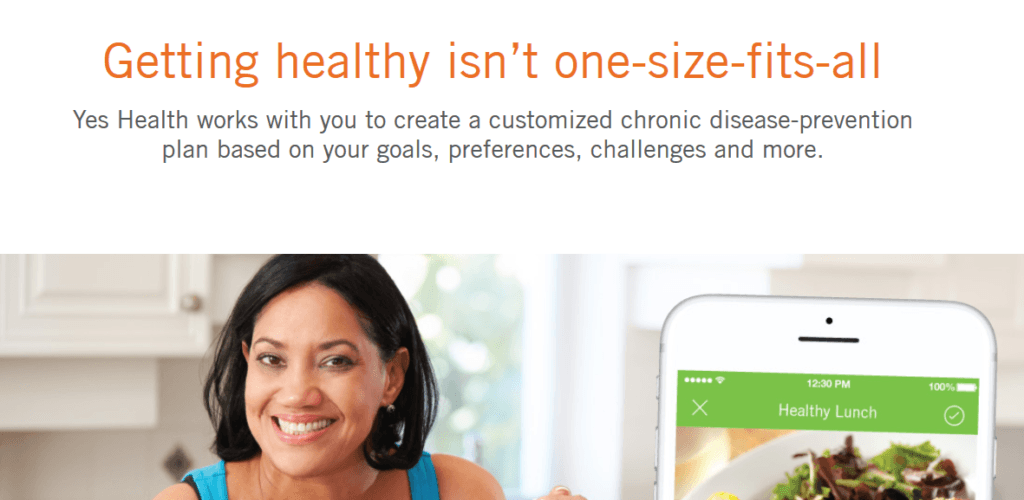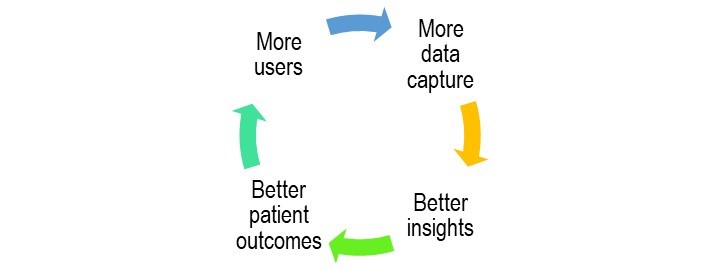Yes Health: Can AI help diabetes patients improve their fitness?

As anyone who’s ever tried dieting knows, “eating healthy” is usually easier said than done! Yes Health is an app that uses AI to make it easier for overweight patients to track nutritional intake and to offer real-time, highly personalized health suggestions. Can Yes Health carve out a sustainable and profitable niche in the $35B+ digital diabetes care industry?
The obesity epidemic is a massive challenge for our healthcare system and for quality of life in society. Especially in western and developed nations, average BMI has gone up over the past century and the incidence of many co-morbidities like diabetes and heart disease has skyrocketed in tandem.
Diet and exercise are key pieces of the puzzle to managing weight, preventing the onset of chronic conditions like diabetes, and negating the need for medical interventions or drugs. It doesn’t take an MD-PhD from Harvard to know that eating less and moving more can help lower weight and improve blood sugar over time. For decades, nutritionists have recommended diet plans and food journals to help patients achieve these goals; NIH meta-research has found that diligent, accurate calorie and activity tracking correlates strongly with higher weight loss (Burke).
However, follow-through with pen-and-paper self-monitoring programs is notoriously low. One 2009 study found the median level of “caloric self-monitoring” adherence was only 55% for patients using a paper diary. Studies also indicate that adherence / self-reporting levels only drop over time as patients lose motivation to stick with their food diaries (Burke).
Creating value through AI-powered personalization
Here’s where Yes Health comes in.

Yes Health is a smartphone app for diabetes patients that helps track intake and activity, provides in-the-moment health recommendations, and equips doctors with valuable data to better inform treatment decisions. Founded by a PayPal alum and $6M in Series A venture backing, Yes Health is poised to transform diabetes management.
- AI-powered tracking: Yes Health uses computer vision to help patients track their caloric and macronutrient intake more easily and accurately, simply by taking pictures of meals. No more googling “how many calories are in a bowl of Frosted Flakes”. Yes Health claims it can estimate the calories and suitability of portion size, simply with a picture. (Included in the most popular annual “Diabetes Management” membership plan is a free FitBit activity tracker and digital scale, so tracking fitness and weight is also streamlined.)
- AI-powered coaching: The app delivers timely, actionable, hyper-personalized recommendations using insights gleaned from its longitudinal data on users as well as expert recommendations from actual dieticians / personal trainers employed by the company. Since Yes Health’s founding in 2015, the app has been able to reduce reliance on these human coaches and shift more of the recommendation/ advice work to its AI models. Imagine immediately knowing if your bowl of Frosted Flakes is much larger than the recommended portion size, before you eat it. This gives patients better information and improves their likelihood of acting on diet tips, without needing expensive healthcare professionals to provide those tips after the fact.
- Connectedness with care team: In addition, Yes Health is set up to share user data and recommendations with the patient’s doctor, if permission is granted. This allows PCPs and healthcare teams to see what’s working and what’s not in a given treatment plan. As we’ve learned, the powerful combination of AI-generated insight and expert human judgment/intuition can lead to breakthrough outcomes.
The proof is in the (low-fat) pudding
How has Yes Health done so far? According to the company, “Members on average lose more than five percent of their starting weight, regularly exercise more than 150 minutes per week and increase their nutrition scores to “healthy” within 13 weeks.” For this reason, Yes Health boasts partnerships with payers like Blue Health California (an HMO plan purveyor), providers like the Diabetes Center at UCSF, and endorsers like the CDC and the American Diabetes Association.
Yes Health benefits from a clear data flywheel effect. The more photos Yes Health sees, the more outcomes it measures, the more advice it gives – the better its predictive power becomes as the cloud-based AI learns. As its user base grows, the team hopes it will create more and more value for members.

Capturing value via third-party payers
While patients obviously stand to gain the most from improved health outcomes, it’s actually third-party health insurers that have the largest financial skin in the game. Lifetime healthcare costs for a diagnosed diabetes patient is 2.3x higher than the average American, and insurers .
Its track record of measurable success has allowed Yes Health to bill through health insurers, rather than billing consumer directly (although that is an option if users wish to sign up). This is a brilliant system, because it places the cost burden on the party who’s most likely to make the upfront investment to save healthcare costs down the line.
Sources
Burke, Lora E, et al. “Self-Monitoring in Weight Loss: a Systematic Review of the Literature.” Journal of the American Dietetic Association, U.S. National Library of Medicine, Jan. 2011, www.ncbi.nlm.nih.gov/pmc/articles/PMC3268700/.
Shieber, Jonathan. “Using AI, Yes Health Cuts Costs, Improves Adherence for Weight Loss and Diabetes Treatment.” TechCrunch, 15 Apr. 2020, techcrunch.com/2020/04/15/using-ai-yes-health-cuts-costs-improves-adherence-for-weight-loss-and-diabetes-treatment/.
Wilhelm, Alex. “Why AI Startups’ Economics Will Likely Improve over Time.” TechCrunch, 6 Apr. 2020, techcrunch.com/2020/04/06/why-ai-startups-economics-will-likely-improve-over-time/.



Thanks for a very interesting post, Megan!
I had never heard of Yes Health before, but it seems to be a terrific tool for calorie-counting diets. I wonder, however, how precisely can the app calculate calories based on pictures of meals. For instance, how does it differentiate between food that has been fried vs. grilled? Or how can it tell if a certain meal has been sweetened with 0-calorie sweetener vs. sugar?
Regardless of the above, I think that this app could be extremely useful to combat obesity and install better eating patterns in our society. I also wonder if Yes Health is experiencing higher user activity and downloads during quarantine!
Wow – this is really cool. I’d never heard of this before either, but it sounds like a really cool tool that not only allows for value capture, but a ton of value creation for its customers and other stakeholders for human health. This reminded me of the June oven, which is able to cook based on photo sensing and AI, similar to what you’ve described above for Yes Health. Maybe a partnership between them in the future could be a great way to increase revenue and customer adoption!
Thanks for sharing this interesting concept! My first thought on the flywheel is whether the link from “better insights” to “better patient outcomes” holds. I wonder how Yes Health addresses the adherence / psychological challenge, which may not necessarily follow from solving the “data problem.” I imagine people respond well to nudges, but to what extent do they discount the “nudges” provided by a machine rather than a human? On the value capture piece, while health insurers are likely to be the ones incentivized to pay, how can they incentivize their members to adopt Yes Health and adhere?
Megan, this is a great post and I very much enjoyed learning about Yes Health’s capabilities. This does address a much-needed issue in obesity. I’m interested to learn more about how this company does. Specifically, how exactly the membership is integrated within insurance plans. Also, are physicians adopting this and encouraging patients to use Yes Health? I imagine younger patients and for that matter, younger physicians would find this useful. However, older patients and older physicians may find the technology too complicated, and chronic conditions tend to affect the elderly more. Another curiosity is that I assume the photography of one’s meal is wholly dependent on the user’s phone camera which I imagine would affect the accuracy of the software’s ability to identify food items. I recently used an app called “AI Mama” which uses a similar algorithm to identify meals from photographs taken on a smartphone to track macronutrients. The findings were vastly different when taking a photo on an iPhone 6 vs an iPhone 11 Pro. Regardless, I think this is a great idea with a lot of scope. Thank you for writing about it.
This is so exciting to learn about! Several years ago, UnderArmour said they were developing this technology leveraging Watson and then a couple years later, the plan/product completely disappeared from their plans and announcements. I’m so happy to hear someone figured it out!
The one thing i’m curious about is how their longer-term studies turn out, 5% weight loss in 13 weeks is great, but so many people fall trap to yo-yo dieting and I wonder how many customers use this technology over the long term. I hope Yes Health can use customer data to create staying power in this product!
Great post and this was my question as well. What does use of this app and continued and/or sustained weight loss look like after 13 weeks? This is especially sensitive for those with diabetes since what and how much they eat impacts insulin levels.
The other question I had was around ability to tie into medical devices that track your insulin levels. If this is really catering towards those with diabetes it would be valuable to understand the integration aspect and if this is a redundant product for that demographic (effectively, do diabetes apps have dieting offerings like yes health).
Great post! I’ve never heard of this company before but I’m glad to see they’ve entered a space where data analytics and AI has a lot of room to add value. I think as we move towards understanding the role PREVENTATIVE healthcare has in our society, Yes Health is and will become even more attractive to health insurers. One thing I’m curious about is how much of a moat does Yes Health have in this space? Especially with the amount of interest coming from health insurers, I see this as an attractive space with pretty low barriers to entry. How will Yes Health defend their position? Will it be a matter of signing up insurers and leveraging their first mover advantage? Will it be in the algorithms they develop? I’d love to see what happens next with them.